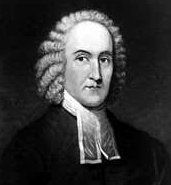Attractive and vivacious, Grace Norman was always in the centre of an admiring group of friends. Her poise and skill on the dance floor attracted many an approving glance.
But such adulation came at a price. In later years she admitted: ‘Dancing was my darling sin and I had thereby nearly lost my life, but God was merciful and spared the sinner’.
Grace was born in Newcastle in 1715; Her parents were regulars at the local parish church and she showed early evidences of a tender conscience. Twice each Sunday the family attended the services and, when Grace was old enough, she began to read the Bible for herself.
Whitefield
But all this was to change when her parents sent her to a dancing school shortly after her eighth birthday. Here the child quickly gained remarkable proficiency. Intoxicated with flattery, she turned her back on the early desires she had once felt to know and please God.
Soon after her twenty-first birthday Grace married a Scotsman, Alexander Murray, a seafaring man. Only four days after their marriage he set sail once more.
Grace meanwhile continued her giddy lifestyle, tempered only by the birth of a daughter. When her child was nearly a year old, Grace received a message from Alexander. He asked her to come to Portsmouth where he was staying after being taken ill at sea. On his recovery the family travelled to London.

There they found the city ringing with stories of a young man named George Whitefield who had been preaching in the fields and commons. ‘Poor man,’ thought Grace, ‘he must be mad’.
But curiosity got the better of her and she asked Alexander to let her go to hear him. He adamantly refused. While still in London, however, their baby daughter was taken ill and died. Shortly after the funeral Alexander returned to sea, leaving Grace distressed and lonely.
Mighty concourse
She found little comfort in the pleasures that had proved so attractive before. Her sister, with whom she was staying, tried to cheer her up and help her forget her loss, but without success.
At last Grace said: ‘I do not know what is the matter with me, but I think it is my soul’. ‘Your soul?’ echoed her sister in surprise: ‘You are good enough for yourself and me too’.
With Alexander far away there was nothing to prevent Grace from listening to the strange preacher who had been addressing the crowds on Blackheath Common.
As she approached the Common she could hear the singing of a mighty concourse of people. Though she had no idea of the words, the sound thrilled Grace with a sense of anticipation.
However, the preacher’s message on ‘You must be born again’ at first left her confused. Nevertheless she returned often to hear Whitefield until he left English shores for America.
Light of truth

Grace had probably understood more than she realised, for as she was reading words in the Epistle to the Romans, the light of truth broke on her soul. The burden of guilt was removed from her conscience: she knew her sins forgiven.
Now her own sister, who had once delighted in Grace’s light-hearted friendship, felt acutely embarrassed by her new ‘religious turn’, and accused her of making a fool of herself. Former friends also shunned her company.
But worse was to follow. Alexander was due home shortly and when he arrived Grace’s sister informed him that the Methodists had affected his wife’s mental balance.
Alexander did not believe it, but when he found that Grace was unwilling to accompany him to places of amusement, his anger and distress were unmeasured. Never was any Methodist to come near his wife, nor could she attend their preaching services.
Finding that he still could not drive away her new seriousness, he proclaimed her insane. ‘You shall forsake those Methodists or I will put you into the mad house’, he declared.

Capitulation
When Grace refused, Alexander stormed out of the house, saying: ‘I am going now to book a place for you’. Grace had only one recourse. She poured out her sorrows and her plight before God.
Presently there was the sound of footsteps on the stairs. Alexander was back. ‘I can’t do it’, he said simply.
Shortly afterwards, Grace was taken seriously ill. Realising he could well lose the woman he truly loved, Alexander capitulated. ‘My dear, will you have anyone sent for?’ he asked.
Even though he left the room when any Methodist preacher came to visit Grace, he had begun to soften to the message they brought. Before he returned to sea in 1741 there was evidence that he too shared her faith in Christ.
It was Alexander’s last voyage. After many months a message came telling Grace that her husband had died at sea.
I have felt his power

Now twenty-six, Grace returned to Newcastle and took work as a domestic servant. Sensitive by nature, she was plunged into depression over Alexander’s death, and this was coupled with an intense spiritual conflict.
Having heard many gifted preachers in London, Grace had become highly critical of those to whom she now listened. Before she had been the centre of attention; now she felt neglected.
The enemy of souls began to sow unbelieving thoughts in her mind until dark clouds of doubt enveloped the young Christian. One day, as she walked in a field beyond the town walls, Satan fired his most venomous dart. ‘Perhaps it is all a lie! Perhaps there is no God’.
‘Satan, you are a liar’, Grace cried out in despair; ‘I know there is a God. I have felt his power. I have tasted his love’. Still there was no reply from heaven, only further taunts from the enemy.
Grace climbed a flight of steps to the top of a tower on the town wall. If there were no God, she would throw herself down to her own destruction.
She gave one last heavenward cry. ‘If there be a God, save me’. And the tempter fled. Gradually Grace came to see that she had grieved the Spirit of God by her critical spirit.
But God had allowed these circumstances both to humble her and prepare her for eminent usefulness.

Problem
During 1742 John Wesley paid his first visit to Newcastle and set up an orphanage to meet the urgent needs he discovered. The city became the northern focus of his work and many were the visits he paid in following years.
Grace Murray became one of Wesley’s most valued workers, caring for the children, tending sick preachers, and working among the women.
In 1748 Wesley himself was taken ill during a visit to Newcastle. For six days Grace cared for him. But to her astonishment, before he left he made her a proposal of marriage. Flattered and amazed, Grace expressed delight and to Wesley’s mind they were now engaged.
But there was a problem. The previous year Grace had nursed another of Wesley’s preachers, John Bennet, through a six-month illness. A strong affection had sprung up between them and they had corresponded regularly.
Affection dictated that she should marry Bennet, but a sense of privilege and a desire for usefulness attracted her to Wesley.

Both men assumed she was engaged to them, and for six agonising months Grace vacillated between the two Johns, sometimes giving one cause for hope and sometimes the other.
At last, as she was on the verge of marrying Wesley in October 1749, Charles Wesley was informed of the situation.
Saddling his horse, he dashed up the country, collected Grace and took her to Bennet. Nor would he leave until he had seen the two satisfactorily married. John Wesley was heartbroken.
Ministry of prayer
Grace and John Wesley met only briefly afterwards and then not again for thirty-nine years. The two preachers went their separate ways on both doctrinal and emotional grounds.
Grace and John Bennet finally settled in Warburton, Cheshire, where Bennet became pastor of an Independent church. Grace was thirty-four when she remarried and five sons were born in quick succession.
But only ten years later she was widowed once more. Forty-four years of widowhood lay ahead — years of loneliness and trial. But they were years of proving the sufficiency of her God.
Prayer became her most important ministry and the throne of grace her constant refuge. She arranged preaching services in her home and young people flocked to her for advice and prayers.
At last, at eighty-eight years of age, weak and nearly blind, Grace Bennet came to the end of her journey. To the last she faced assaults from the tempter, but her Saviour came to help her through the last deep river.
‘When will his chariot wheels advance to call his exile home? Sweet Jesus, come quickly! My soul is at rest’, were among her last words. And on 23 February 1803 those chariots of God carried her home.





